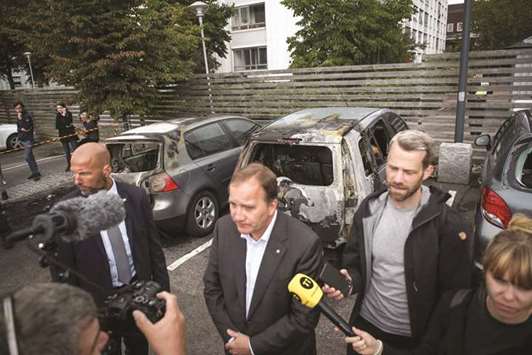Youths torched and vandalised scores of cars in the Swedish city of Gothenburg and surrounding towns, with Prime Minister Stefan Lofven saying yesterday that the disturbances looked organised “almost like a military operation”.
“I’m furious. My question to (the perpetrators) is: what the hell are you doing?” he said on public Swedish Radio yesterday. “You’re ruining things for yourselves, your parents and your neighbourhoods’”
It is unclear what triggered Monday night’s unrest but Sweden has seen a rise in violence in areas with high unemployment and other social problems and the incident echoed rioting in the capital Stockholm in 2013.
No one was injured in the car blazes.
“We’ve never seen this many cars set on fire before,” Hans Lippens, police spokesman in western Sweden, told AFP.
Mounting public concern about gang-related and other violence has become a central issue in campaigning ahead of a national election on September 9.
Police said that up to 100 cars were either set fire to or vandalised in Gothenburg, Sweden’s second-biggest city located in the western part of the country, and in nearby towns such as Falkenberg and Trollhattan, an industrial area with high unemployment.
Two men, aged 16 and 21, were arrested yesterday and police said it expected to make more arrests during the day.
Police said gangs were involved but gave no details.
Swedish towns have seen sporadic violence on a smaller scale in mid-August in recent years at the end of the school summer break.
“We believe that up to 100 cars have been burned or damaged,” police spokeswoman Ulla Brehm said. “They were organised and prepared.”
A handful of cars were also burned overnight in Stockholm.
“It seems very organised, almost like a military operation,” Lofven said. “Society is always going to react strongly to this kind of thing.”
He visited the region yesterday and met police.
The violence echoed rioting by hundreds of youths in Stockholm and some of its poorer suburbs in 2013, sparked by the police killing of a 69-year-old wielding a machete in a suburb that prompted accusations of police brutality.
Law and order is a key issue ahead of the election after a spike in gang violence saw more than 40 people shot dead last year.
Last year in February, two days after US President Donald Trump’s baffling comments linking crime to immigration in Sweden, riots broke out in the immigrant-heavy northern Stockholm suburb of Rinkeby.
Dozens of youths clashed with police after they arrested a suspected drug dealer in Rinkeby.
The rioters threw stones at police, burned cars and looted shops.
Despite economic growth that has for years been the envy of most of Europe, Lofven’s Social Democrats, the bigger party in the current minority coalition, are on track for their worst ever election result, according to opinion polls.
Voters also worry about the welfare system, falling school results and the effects of a surge in immigration that saw around 160,000 people seek asylum in Sweden in 2015.
The concerns have benefited the populist, anti-immigration Sweden Democrats who look poised to become one of the three biggest parties in parliament after the vote.
“Sweden has tolerated this for too long. This must end now,” Ulf Kristersson, leader of the conservative opposition party, the Moderates, wrote on his Facebook account.

Prime Minister Stefan Lofven (centre) speaks with journalists after a meeting with local police at Frolunda torg in Gothenburg.
